名词性从句的写作
- 格式:ppt
- 大小:449.50 KB
- 文档页数:15
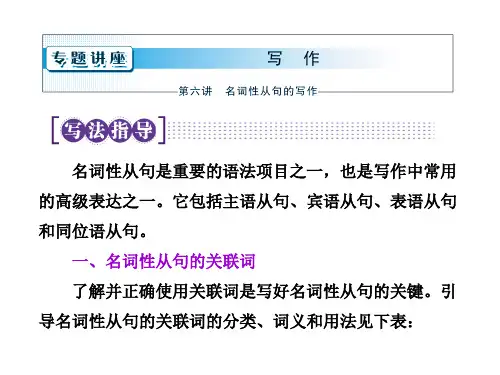


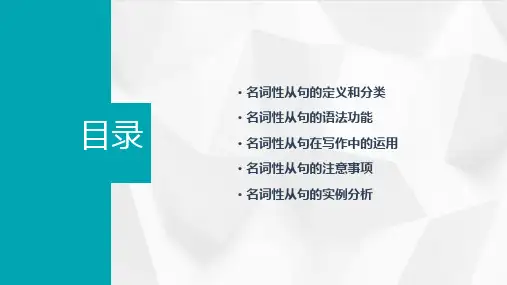

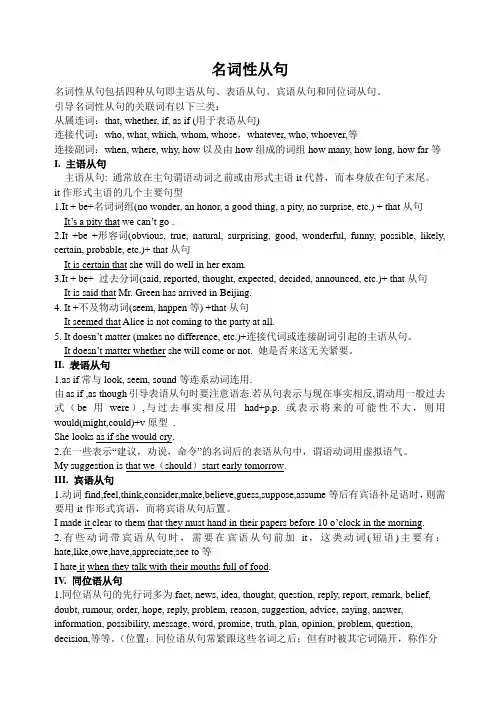
名词性从句名词性从句包括四种从句即主语从句、表语从句、宾语从句和同位词从句。
引导名词性从句的关联词有以下三类:从属连词:that, whether, if, as if (用于表语从句)连接代词:who, what, which, whom, whose,whatever, who, whoever,等连接副词:when, where, why, how以及由how组成的词组how many, how long, how far等I. 主语从句主语从句: 通常放在主句谓语动词之前或由形式主语it代替,而本身放在句子末尾。
it作形式主语的几个主要句型1.It + be+名词词组(no wonder, an honor, a good thing, a pity, no surprise, etc.) + that从句It’s a pity that we can’t go .2.It +be +形容词(obvious, true, natural, surprising, good, wonderful, funny, possible, likely, certain, probable, etc.)+ that从句It is certain that she will do well in her exam.3.It + be+ 过去分词(said, reported, thought, expected, decided, announced, etc.)+ that从句It is said that Mr. Green has arrived in Beijing.4. It +不及物动词(seem, happen等) +that从句It seemed that Alice is not coming to the party at all.5. It doesn’t matter (makes no difference, etc.)+连接代词或连接副词引起的主语从句。
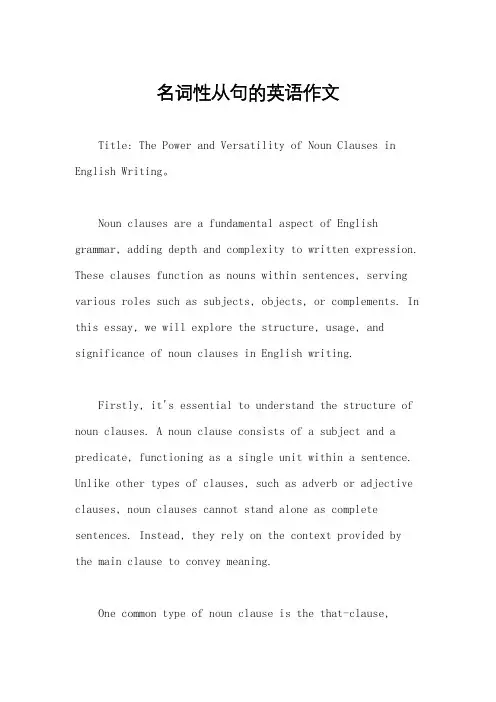
名词性从句的英语作文Title: The Power and Versatility of Noun Clauses in English Writing。
Noun clauses are a fundamental aspect of English grammar, adding depth and complexity to written expression. These clauses function as nouns within sentences, serving various roles such as subjects, objects, or complements. In this essay, we will explore the structure, usage, and significance of noun clauses in English writing.Firstly, it's essential to understand the structure of noun clauses. A noun clause consists of a subject and a predicate, functioning as a single unit within a sentence. Unlike other types of clauses, such as adverb or adjective clauses, noun clauses cannot stand alone as complete sentences. Instead, they rely on the context provided by the main clause to convey meaning.One common type of noun clause is the that-clause,introduced by the subordinating conjunction "that." For example, in the sentence "I believe that he will succeed," the clause "that he will succeed" serves as the directobject of the verb "believe." Similarly, noun clauses can begin with question words like "who," "what," "where," "when," "why," and "how." For instance, "She doesn't know where they went" contains the noun clause "where they went," functioning as the direct object of the verb "know."Noun clauses offer writers a versatile tool for expressing ideas and providing additional information. They can serve as subjects, objects, or complements within sentences, allowing for greater flexibility and complexityin sentence structure. Additionally, noun clauses are often used to express opinions, beliefs, desires, or hypothetical situations.One significant advantage of noun clauses is theirability to condense information and streamline writing. Instead of using multiple sentences to convey related ideas, writers can incorporate noun clauses to consolidate their thoughts and maintain coherence. For example, rather thanstating "The fact that she arrived late surprised everyone," a writer could simply say "Her late arrival surprised everyone," using a noun clause to convey the same meaning more concisely.Moreover, noun clauses facilitate the expression of complex concepts and relationships within sentences. By acting as nouns, these clauses enable writers to connect ideas seamlessly and articulate nuanced distinctions. For instance, consider the sentence "His insistence that the project be completed on time underscored his commitment to excellence." Here, the noun clause "that the project be completed on time" serves as the direct object of the noun "insistence," elucidating the specific requirement emphasized by the subject.In addition to their structural role, noun clauses contribute to the overall coherence and cohesion of written discourse. By linking clauses and providing context, these clauses help readers navigate the flow of information and understand the relationships between different parts of a text. Consequently, skilled writers utilize noun clausesstrategically to enhance clarity and engage their audience effectively.Furthermore, noun clauses play a crucial role in formal writing, such as academic essays, reports, and professional correspondence. Their precision and versatility make them invaluable for conveying complex ideas and supporting arguments with evidence or rationale. By incorporating noun clauses, writers can elevate the sophistication and credibility of their prose, demonstrating a mastery of language and rhetorical strategy.In conclusion, noun clauses are indispensable elements of English writing, enabling writers to convey meaning, structure sentences, and connect ideas effectively. Through their flexibility, precision, and coherence, noun clauses enrich written expression and empower writers to communicate with clarity and sophistication. As writers continue to explore the potential of noun clauses, they unlock new possibilities for creativity, expression, and persuasion in their writing endeavors.。

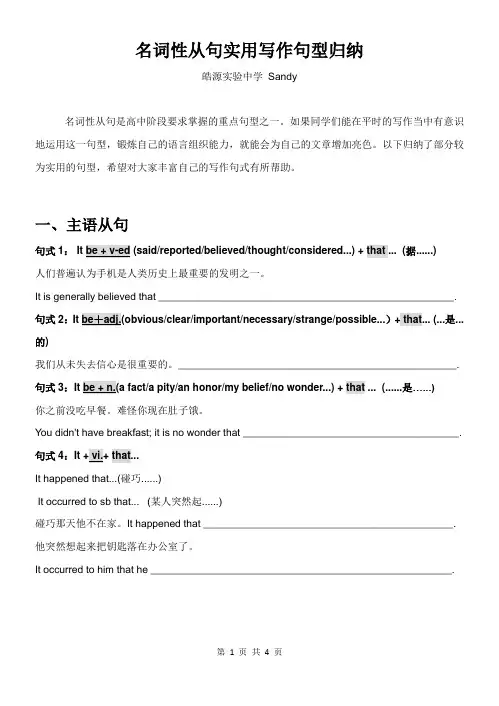
名词性从句实用写作句型归纳皓源实验中学Sandy名词性从句是高中阶段要求掌握的重点句型之一。
如果同学们能在平时的写作当中有意识地运用这一句型,锻炼自己的语言组织能力,就能会为自己的文章增加亮色。
以下归纳了部分较为实用的句型,希望对大家丰富自己的写作句式有所帮助。
一、主语从句句式1: It be + v-ed (said/reported/believed/thought/considered...) + that ... (据......)人们普遍认为手机是人类历史上最重要的发明之一。
It is generally believed that ____________________________________________________.句式2:)+ that... (...是...的)我们从未失去信心是很重要的。
_________________________________________________. 句式3:It be + n.(a fact/a pity/an honor/my belief/no wonder...) + that ... (......是…...)你之前没吃早餐。
难怪你现在肚子饿。
You didn't have breakfast; it is no wonder that ______________________________________. 句式4:It + vi.+ that...It happened that...(碰巧......)It occurred to sb that... (某人突然起......)碰巧那天他不在家。
It happened that ____________________________________________. 他突然想起来把钥匙落在办公室了。
It occurred to him that he _____________________________________________________.二、宾语从句句式1: sb. wonder whether/if ...(某人想知道是否……)1.我想知道你能否给我提供一些如何交朋友的建议。
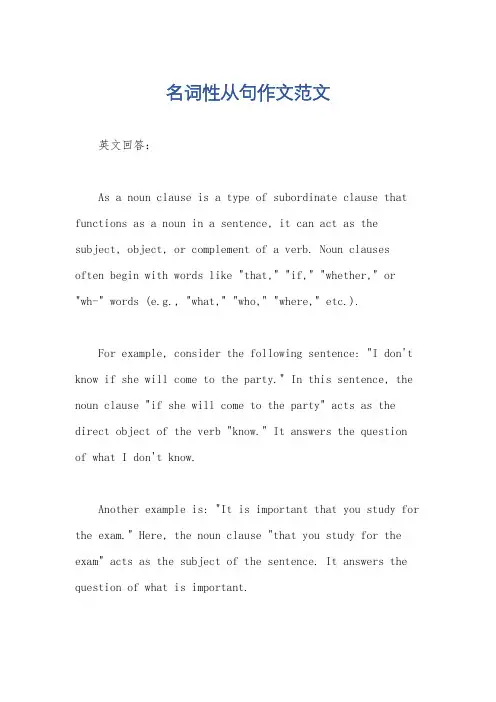
名词性从句作文范文英文回答:As a noun clause is a type of subordinate clause that functions as a noun in a sentence, it can act as the subject, object, or complement of a verb. Noun clauses often begin with words like "that," "if," "whether," or "wh-" words (e.g., "what," "who," "where," etc.).For example, consider the following sentence: "I don't know if she will come to the party." In this sentence, the noun clause "if she will come to the party" acts as the direct object of the verb "know." It answers the question of what I don't know.Another example is: "It is important that you study for the exam." Here, the noun clause "that you study for the exam" acts as the subject of the sentence. It answers the question of what is important.Noun clauses can also function as the complement of a verb. For instance, in the sentence "My goal is to become a successful entrepreneur," the noun clause "to become a successful entrepreneur" acts as the complement of the verb "is." It answers the question of what my goal is.中文回答:名词性从句是一种在句子中作为名词功能的从句,可以充当动词的主语、宾语或补语。

名词性从句在写作中的应用名词性从句是由一个引导词引导的,能在句中充当名词的从句。
在写作中,名词性从句的应用非常广泛,可以用于句子的主语、宾语、表语以及同位语等位置,使文章更加丰富多样。
本文将探讨名词性从句在写作中的具体应用。
1. 名词性从句作主语的应用名词性从句可以作为句子的主语,起到引出话题、提出问题的作用。
例如:What he said surprised me.(他说的话让我很吃惊。
)Who will win the competition is still unknown.(谁将赢得比赛仍然未知。
)通过使用名词性从句作主语,可以使句子更加生动有趣,引发读者的兴趣。
2. 名词性从句作宾语的应用名词性从句可以作为动词的宾语,起到解释说明、表示观点的作用。
例如:I believe that hard work pays off in the end.(我相信努力工作最终会有回报。
)She asked me what time the meeting starts.(她问我会议什么时候开始。
)通过使用名词性从句作宾语,可以使文章更加具体明确,增加观点的阐述力。
3. 名词性从句作表语的应用名词性从句可以作为系动词的表语,起到说明、解释、判断的作用。
例如:Her dream is to become a successful entrepreneur.(她的梦想是成为一名成功的企业家。
)The most important thing is that you enjoy what you do.(最重要的是你喜欢你所做的事情。
)通过使用名词性从句作表语,可以使句子更加丰富多样,增加表达的层次感。
4. 名词性从句作同位语的应用名词性从句可以作为一个名词的同位语,起到解释补充的作用。
例如:The fact that she won the award surprised everyone.(她获奖的事实让每个人都很惊讶。
Noun clauses in writing找出文章中的名词性从句,并标明为哪种名词性从句As for me, I have formed some good study habits. Every time I decide to study, I can put my heart into it, sometimes ignoring what is going on around me. I consider that it is necessary to focus on the study and never be absent-minded. In addition, I am able to finish what I should do today instead of leaving it till tomorrow, which has made a different to my study.As a student who used to fail in study. I have realized how important it is to get into good study habits. When I was in junior school. I did badly in English. I wanted to give it up at one time. Thanks to my English teacher who gave me some useful suggestions that I should get into good study habits which have made a big different to my study so far.It is of great importance that we students should have good study habits. Good study habits are not difficult to form. What we can keep in mind is that telling ourselves to do it often. Besides, we can also turn to our teachers for some useful suggestions and stick to doing what we should do. In this way, I do believe that everyone can make great progress in study.●一句多译(Develop the sentences)1.我们都知道没有什么比健康更重要的。
用名词性从句写作文ntroduces oneself: Hello! I am come from 浦城 the second highschool nine grades 0 class of schoolmates Today very much is honoredthe station lecturesin here for fellow schoolmates teacher, I lecturethe topic is lets the Earth smile Earth, we dearest mother. But when the earth is polluted works as theair in is not fresh, when forest no longer cover The dear friends youhave thought? This is how serious issue! The pollution environmentquestion everywhere obviously, the Earth mother soon lost the formerdays the brilliance. The friend, asked we also can be aloof? FriendsRegarding the pollution environment question everywhere obviously, themother is not smiling. Aren't we grieved? The dear schoolmates, let usgo into action, starts from the minor matter Launches theenvironmental protection activity, but also a mother piece of pureland Let us the mother anew have an enchanting smile。
名词性从句在英语作文中英文回答,In English writing, a noun clause is a groupof words that acts as a noun in a sentence. It can be the subject, object, or complement of the main verb. For example, in the sentence "I know what you did", the noun clause "what you did" acts as the direct object of the verb "know". Noun clauses are commonly used to add complexityand depth to sentences, and they often begin with wordslike "that", "whether", "who", "whom", "what", "which", "why", "where", "when", or "how".中文回答,在英语写作中,名词性从句是一组词在句子中充当名词的作用。
它可以是主语、宾语或主谓补语。
例如,在句子“我知道你做了什么”中,名词性从句“你做了什么”充当动词“知道”的直接宾语。
名词性从句通常用来增加句子的复杂性和深度,它们通常以“that”、“whether”、“who”、“whom”、“what”、“which”、“why”、“where”、“when”或“how”等词开头。
名词性从句在写作中的应用名词性从句是指在句中充当名词的从句。
它可以作为主语、宾语、表语、同位语等,在写作中应用广泛,可以使文章更加精炼、简洁、准确。
作为主语名词性从句可以作为一个完整的主语,来说明整个句子要表达的意思。
例如,"What he said is true."中的"What he said"就是一个名词性从句作为主语。
采用名词性从句作为主语,可以避免过多使用单一主语、单一动词的表达方式,使得文章表述更加多样化。
例如,如果我们使用传统的主语和谓语的表达方式,可能会出现"His statement is true."这样的句子。
但如果我们使用名词性从句作为主语,可以形成更加精炼的表达,使得文章更加简洁。
作为宾语在句子中,名词性从句可以作为动词的宾语,表明动作的对象或者内容。
例如,"I know what you did last summer."中的"what you did last summer"作为宾语,表明说话人了解对方去年夏天做了什么事情。
使用名词性从句作为宾语,可以使得文章更加精准,避免模糊性。
例如,如果我们使用传统的宾语表达方式,可能会出现"I know about your activity last summer."这样的句子,但是这个句子并没有非常准确地表达说话人知道的事情。
但是如果使用名词性从句作为宾语,就可以表达更加精准的信息,使得文章更加准确。
作为表语名词性从句可以作为表语,说明主语的状态或者性质。
例如,"His problem is that he is lazy."中的"that he is lazy"作为表语,表明他的问题是因为他比较懒。
使用名词性从句作为表语,可以使得文章更加严密、准确。
如果我们使用传统的表语表达方式,可能出现"His problem is his laziness."这样的句子。